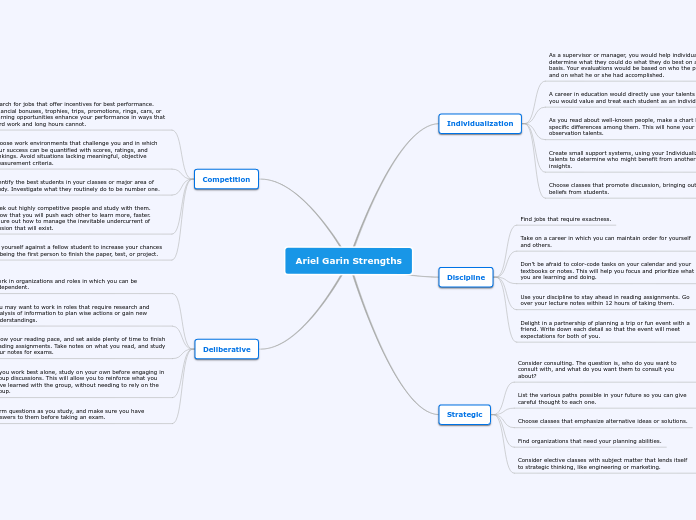Ariel Garin Strengths
Individualization
As a supervisor or manager, you would help individuals determine what they could do what they do best on a regular basis. Your evaluations would be based on who the person is and on what he or she had accomplished.
A career in education would directly use your talents because you would value and treat each student as an individual.
As you read about well-known people, make a chart listing specific differences among them. This will hone your observation talents.
Create small support systems, using your Individualization talents to determine who might benefit from another’s insights.
Choose classes that promote discussion, bringing out varying beliefs from students.
Discipline
Find jobs that require exactness.
Take on a career in which you can maintain order for yourself and others.
Don’t be afraid to color-code tasks on your calendar and your textbooks or notes. This will help you focus and prioritize what you are learning and doing.
Use your discipline to stay ahead in reading assignments. Go over your lecture notes within 12 hours of taking them.
Delight in a partnership of planning a trip or fun event with a friend. Write down each detail so that the event will meet expectations for both of you.
Strategic
Consider consulting. The question is, who do you want to consult with, and what do you want them to consult you about?
List the various paths possible in your future so you can give careful thought to each one.
Choose classes that emphasize alternative ideas or solutions.
Find organizations that need your planning abilities.
Consider elective classes with subject matter that lends itself to strategic thinking, like engineering or marketing.
Competition
Search for jobs that offer incentives for best performance. Financial bonuses, trophies, trips, promotions, rings, cars, or learning opportunities enhance your performance in ways that hard work and long hours cannot.
Choose work environments that challenge you and in which your success can be quantified with scores, ratings, and rankings. Avoid situations lacking meaningful, objective measurement criteria.
Identify the best students in your classes or major area of study. Investigate what they routinely do to be number one.
Seek out highly competitive people and study with them. Know that you will push each other to learn more, faster. Figure out how to manage the inevitable undercurrent of tension that will exist.
Pit yourself against a fellow student to increase your chances of being the first person to finish the paper, test, or project.
Deliberative
Work in organizations and roles in which you can be independent.
You may want to work in roles that require research and analysis of information to plan wise actions or gain new understandings.
Know your reading pace, and set aside plenty of time to finish reading assignments. Take notes on what you read, and study your notes for exams.
If you work best alone, study on your own before engaging in group discussions. This will allow you to reinforce what you have learned with the group, without needing to rely on the group.
Form questions as you study, and make sure you have answers to them before taking an exam.
